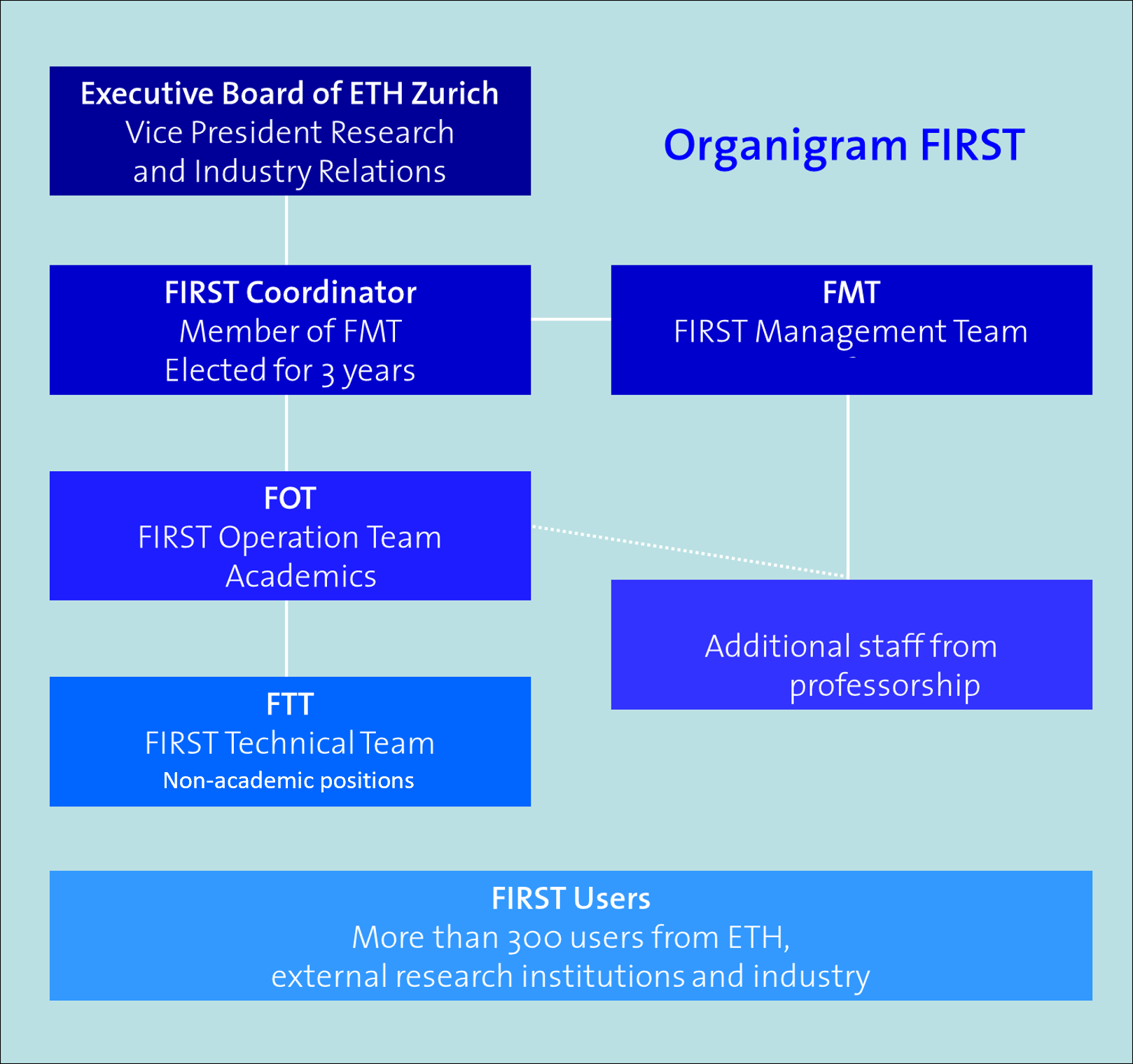Organisation
The organization and operation of the FIRST-Lab are based on the Operation Guideline. The latest version can be downloaded protected page here.

The FIRST-Lab Coordinator reports to the Vice President for Research and Industrial Relations of the ETH Zürich and represents the FMT and the FOT. He is elected for a 3-year period by the ETH Executive Board upon recommendation of the members of the FMT. The Coordinator is chosen from the members of the FMT. Ideally, the Coordinator is selected on a rotational basis from within the FMT.
The FIRST-Lab Coordinator implements the strategic and scientific guidelines of the FMT. The Coordinator analyzes requests for new processes and new equipment in the FIRST-Lab. He submits proposals with major impact on resources and budget to the FMT. The Coordinator is responsible for the running cost budget of FIRST and the budgets for extraordinary maintenance and new equipment. He submits the activities of the FOT.
Contact the First-Lab Coordinator
The FIRST Operation Team (FOT) consists of three academic employees. They are responsible for the management of the facility operation. This includes technical, scientific, educational and administrative work for:
- Development, implementation and maintenance of processes (compatibility, feasibility, equipment availability).
- Evaluation, procurement, installation and maintenance of the FIRST-Lab equipment.
- Maintenance of the cleanroom infrastructure.
- Training of the FIRST-Lab users.
- Project administration.
- Facility budgeting and accounting, invoicing.
- Supervising Technicians and FMT staff.
- Safety.
- Public relations.
Contact the FOT
The FIRST Technical Team is formed by technical and adminsitrative staff to support the operation of the FIRST-Lab. The members of the FTT take care of chemicals and disposals, cleaning and overalls, lab supplies, repairs and machine maintenance.
Contact members of the FTT
The FIRST Management Team (FMT) consists of those ETH Professors who have a major technological and scientific involvement and take responsibility in the FIRST-Lab by contributing actively to its operation. Each FMT Professor has to contribute manpower support to the FIRST-Lab for the benefit of the whole operation. This personnel support is referred to as the FMT staff. The FMT Professors and their group members are considered to be primary users of the FIRST-Lab. The FIRST-Coordinator represents the FMT to the ETH Management.
The FMT provides the scientific and operational guidelines for the FOT (FIRST Operation Team). The FMT Professors and their group members are considered to be primary users of the FIRST-Lab, and in charge of major FIRST equipment (e.g. MBE, MOCVD, e-beam writing, nano-lithography etc.) using it up to 50% under operating conditions.
Each FMT Professor has to contribute the equivalent of one position for manpower support to the FIRST lab.
The FMT meets with the FIRST-Coordinator at least once a year to address the following issues:
- Define the scientific and strategic directions of FIRST.
- Decide on both priorities and feasibility of major research projects within FIRST.
- Approve the FIRST annual budget, which is submitted by the FIRST-Coordinator.
- Approve modifications and revisions of the user guidelines, as submitted by the FIRST-Coordinator.
- Determine FMT membership: Decide upon acceptance of new members to the FMT and withdrawal of FMT members who have reduced their FIRST-Lab involvement.
- Decide upon the purchase of equipment that has a major impact on budget, space, infrastructure or personnel.
- Define FMT staff and the major equipment interests of the FMT.
Contact members of the FMT
Apart from the FIRST positions financed by the ETH Management, the FIRST users have the possiblity to support FIRST. This support is rewarded at an hourly rate which is deducted from the usage costs of the corresponding group. The user support is organized and managed by the FOT and will be engaged in the following areas:
- Responsibilitiy for certain equipment.
- User training courses on systems execution of routine and standard processes.
- Evaluation of test series.
- Mentoring of new users of other groups than the own one.
- Evaluation and acquisition of new equipment.